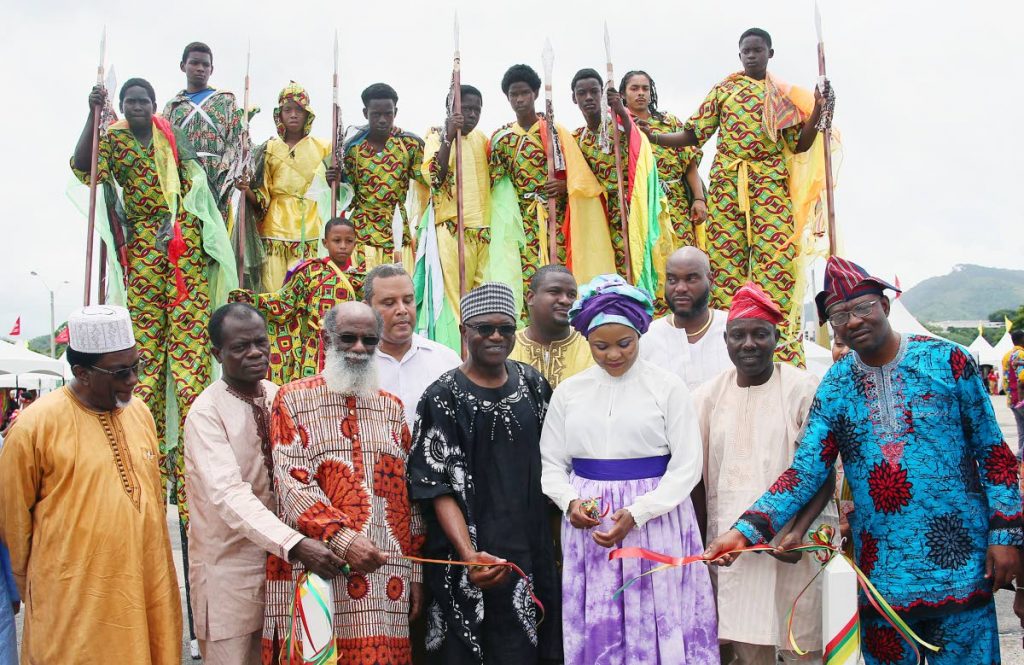Silence on slavery reparations

Chairman of the Emancipation Support Committee (ESC) Khafra Kambon has described as “disappointing,” Caricom’s silence on reparations for African peoples, five years after a committee was set up to address the issue.
Emancipation celebrations began in earnest, yesterday, at the Lidj Yasu Omowale Emancipation Village, Queen’s Park Savannah, Port of Spain.
However, Kambon said he had not heard any statement about reparations from either Caricom or the TT Government in the run up to yesterday’s launch.
“It is very disappointing that so far we have not heard anything from Caricom on reparations,” he told Sunday Newsday.
“Caricom had taken a collective decision and so far we have not heard any statement. We don’t know if it has been said at Caricom meetings and we don’t know or don’t hear.
“At least, I have not heard anything about it from our current government. And that is disappointing because it is an important issue.”
The Caricom Reparations Commission (CRC), chaired by Barbadian historian Sir Hilary Beckles, was established in September 2013 to address the fallout from the enslavement of African peoples.
It unveiled a ten-point plan for reparatory justice one year later which outlined demands for reparations from Europe in relation to the suffering Africans endured during the Atlantic slave trade.
Among the CRC’s demands were informal apologies from all of the nations involved, repatriation of displaced Africans to their homeland, programmes to help educate Africans about their histories sand institutions to improve the literacy and physical and psychological health of descendants of slavery.
Saying reparations was much more than a buzz word for the committee, Kambon said it remained a permanent part of their agenda.
However, he acknowledged it also may be a sore topic for African descendants who feel indebted to the Europeans.
“They feel the Europeans rescued them from a backward society and, therefore, deep in their soul they cannot feel an urge for reparations because they feel they have gained.”
Kambon said the thinking was due to a lack of understanding about African history “because if you know your history, you would know that great civilisations were destroyed as a result of that slave trade and you would know that you had civilisations more advanced from a much earlier period.”
He added: “But if you don’t know that and you just looking at today’s age, comparing those who have gained wealth by theft and murder with those who have been victims of that theft and murder and making the comparison and thinking that something in your mind is making you feel that it has to do with inferior and superior people, then you don’t even feel that urge for reparations.”
Kambon said from a psychological point-of-view, the fight for reparations was very important because it unearths historical realities.
He said in the Caribbean, the call for reparations can be applied to Africans and the indigenous people, who experienced genocide by having their population reduced from millions to a few thousands.
“So, if we don’t have that battle for reparations, how is this coming to light. The battle helps to bring the truth to light. And the truth is a liberating truth.”
Kambon said African descendants were also owed materially “and we have to continue to fight for that until we get it.”
The ESC chairman urged supporters of the observance to continue to ensure its survival.
Alluding to Government subvention of $1.8 million for this year’s celebration, Kambon said: “We have to call on those who appreciate emancipation to contribute because it is not up to Government alone although they have a responsibility. It is also the responsibility of people who value this to contribute to make it survive.”
He said the organisation has done a lot for African pride and education in the society and it needs to survive.
Last year, the ESC received $2 million from Government to help manage its affairs.
To offset expenses, Kambon said patrons who visit the Emancipation Village after 3 pm, would be required to pay a small entrance fee of $20.
“This has never happened before. So, people can be there all day up to 3 pm and not pay any money. But those coming in after 3 pm would have to pay.”
Kambon said the vendors and performers in the village needed support.
“There is shopping and tremendous entertainment because a lot of the artistes who perform, this is an important time for them to earn some income and we cannot do it out of a declining subvention.”
Saying emancipation was much more than “people putting on clothes and walking on the streets,” Kambon also urged Government to fully explore its tourism potential.
He observed the occasion was not seen as an economic asset.
“This festival can bring more to the country and the Government in economic terms, much more than the value of a subvention .
“There is not match in the value because we are talking about a major tourism asset. But you have to invest in making it that.”
Kambon said some strides were already being made to elevate the profile of emancipation overseas.
He said over the years, journalists in radio stations throughout the region and beyond would often interview him and other members of the committee about the significance of the occasion.
“It has so much potential and everybody recognises that. People are amazed. We don’t have the capacity to market it abroad.”
He said Africa, perhaps the world’s poorest continent, has a huge and wealthy middle class that was “tremendously attracted” to emancipation “but we not marketing to them.”
Kambon said a comprehensive marketing strategy would ensure the hotels and airlines are filled with visitors.
“That would mean there is an investment in something that has economic value.”
Emancipation Day was declared a national holiday in TT in 1985.

Comments
"Silence on slavery reparations"